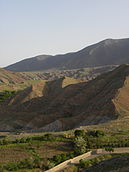Nishapur
|
Nishapur نیشابور Neyshabur |
||||||||
|---|---|---|---|---|---|---|---|---|
|
||||||||
|
||||||||
| Nickname(s): Sassanid and Umayyed era: Abarshahr (Upper Cities), Little Damascus (by Ibn Battuta) | ||||||||
| Coordinates: 36°12′48″N 58°47′45″E / 36.21333°N 58.79583°ECoordinates: 36°12′48″N 58°47′45″E / 36.21333°N 58.79583°E | ||||||||
| Country |
|
|||||||
| Province | Khorasan | |||||||
| County | Nishapur County | |||||||
| Foundation | 3rd century | |||||||
| Municipality of Nishapur | 1931 | |||||||
| Government | ||||||||
| • Mayor | Seyed Abbas Hosseini | |||||||
| • Governor of County | Gholam-Hossein Mozaffari | |||||||
| Elevation | 1,250 m (4,100 ft) | |||||||
| Population (2011) | ||||||||
| • City | 276,089 | |||||||
| • Nishapur County | 433,105 | |||||||
| • Urban areas of Nishapur County | 270,301 | |||||||
| 2 Census | ||||||||
| Demonym(s) | Nishapuri | |||||||
| Time zone | IRST (UTC+03:30) | |||||||
| Website |
www |
|||||||
Nishapur or Nishabur (![]() pronunciation ; Persian: نیشابور, also Romanized as Nīshāpūr, Nīshābūr, and Neyshābūr from Middle Persian: New-Shabuhr, Nisha means night and Pur means city in Sanskrit meaning City of Night, meaning "New City of Shapur", "Fair Shapur", or "Perfect built of Shapur") is a city in the Khorasan Province, capital of the Nishapur County and former capital of Province Khorasan, in northeastern Iran, situated in a fertile plain at the foot of the Binalud Mountains. It had an estimated population of 239,185 as of 2011 and its county 433,105. Nearby are the turquoise mines that have supplied the world with turquoise for at least two millennia. The city was founded in the 3rd century by Shapur I as a Sasanian satrapy capital. Nishapur later became the capital of Tahirid dynasty and was reformed by Abdullah Tahir in 830, and was later selected as the capital of Seljuq dynasty by Tughril in 1037. From the Abbasid era to the Mongol invasion of Khwarezmia and Eastern Iran, the city evolved into a significant cultural, commercial, and intellectual center within the Islamic world. Nishapur, along with Merv, Herat and Balkh were one of the four great cities of Greater Khorasan and one of the greatest cities in the middle ages, a seat of governmental power in eastern of caliphate, a dwelling place for diverse ethnic and religious groups, a trading stop on commercial routes from Transoxiana and China, Iraq and Egypt.
pronunciation ; Persian: نیشابور, also Romanized as Nīshāpūr, Nīshābūr, and Neyshābūr from Middle Persian: New-Shabuhr, Nisha means night and Pur means city in Sanskrit meaning City of Night, meaning "New City of Shapur", "Fair Shapur", or "Perfect built of Shapur") is a city in the Khorasan Province, capital of the Nishapur County and former capital of Province Khorasan, in northeastern Iran, situated in a fertile plain at the foot of the Binalud Mountains. It had an estimated population of 239,185 as of 2011 and its county 433,105. Nearby are the turquoise mines that have supplied the world with turquoise for at least two millennia. The city was founded in the 3rd century by Shapur I as a Sasanian satrapy capital. Nishapur later became the capital of Tahirid dynasty and was reformed by Abdullah Tahir in 830, and was later selected as the capital of Seljuq dynasty by Tughril in 1037. From the Abbasid era to the Mongol invasion of Khwarezmia and Eastern Iran, the city evolved into a significant cultural, commercial, and intellectual center within the Islamic world. Nishapur, along with Merv, Herat and Balkh were one of the four great cities of Greater Khorasan and one of the greatest cities in the middle ages, a seat of governmental power in eastern of caliphate, a dwelling place for diverse ethnic and religious groups, a trading stop on commercial routes from Transoxiana and China, Iraq and Egypt.
...
Wikipedia








